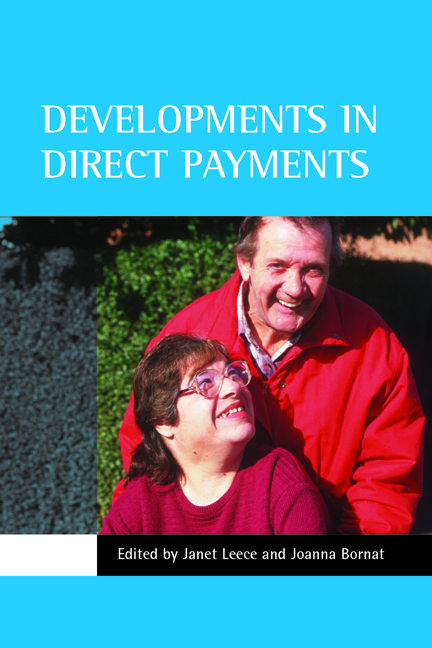Book contents
eighteen - Direct payments and health
Published online by Cambridge University Press: 18 January 2022
Summary
There are multiple intersections between direct payments and health. For example, direct payments can enable users to experience improvements in their mental health and well-being as a result of being able to exercise greater choice and control over who supports them, how and when. High levels of continuity and good-quality relationships with personal assistants can make significant contributions to improving mental health and reducing anxiety and depression. Direct payments can also facilitate the establishment of support arrangements that cross the blurred – and highly contested – boundaries between the ‘health’ and ‘social’ elements of personal care, creating integrated support arrangements that include elements of both.
This chapter focuses on the latter of these links – the use of direct payments to bridge the ‘Berlin Wall’ between health and social care. This is a highly problematic area of direct payments policy and practice, and one of concern and uncertainty for users of direct payments, professionals and managers alike. The chapter will first of all set out the wider policy contexts within which these uncertainties arise, particularly the shifting boundaries between ‘health’ and ‘social’ care; the recent introduction of measures to break down the ‘Berlin Wall’ between these sectors; and the growing pressures to deliver integrated or seamless services to older and younger disabled people and people with mental health problems.
The chapter will then report on research carried out during 1999 into the use of direct payments to purchase health-related support and services. Drawing on direct payments schemes in three different localities, the research investigated how far direct payments users constructed packages of support that included health-related as well as social care needs; and their views on the advantages and challenges of using direct payments in this way. These views were complemented by the perspectives of personal assistants (see Glendinning et al, 2000a, 2000b and 2000c for the full study findings).
The research was conducted two years after the implementation of the 1996 Community Care (Direct Payments) Act. At that time, direct payments were restricted to adults aged between 18 and 65; their extension to older people, young adults and parents of disabled children had yet to take place.
- Type
- Chapter
- Information
- Developments in Direct Payments , pp. 253 - 268Publisher: Bristol University PressPrint publication year: 2006



